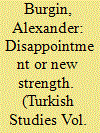| Srl | Item |
| 1 |
ID:
116326


|
|
|
|
|
| Publication |
2012.
|
| Summary/Abstract |
Is the decline of Turkish public support for the European Union (EU) membership better explained by a disappointment about the EU approach to Turkey or by the new self-confidence of the country? This question is relevant because frustration about the accession process could be overcome with more positive signals from the EU. However, if the second factor plays a significant role, this would be an indicator for an enduring alienation between Turks and the EU. This article presents the results of an exploratory study based on an online survey and personal interviews. For one-third of the 618 respondents to the survey, the most important reason for waning EU support is the new strength of Turkey as a rising regional power. In contrast, the interviewed parliamentarians and local party officials consider Turkey's proactive foreign policy approach in its Eastern neighborhood as a complementary and not alternative strategy to Turkey's EU accession.
|
|
|
|
|
|
|
|
|
|
|
|
|
|
|
|
| 2 |
ID:
134774


|
|
|
|
|
| Summary/Abstract |
The fading credibility of Turkey's European Union (EU) membership perspective has undermined the conditionality strategy of the EU. However, outside of the formal setting of the accession talks, twinning projects are considered as a tool to keep Europeanization processes on track. Based on the principle of partnership, these projects aim to induce domestic change via social learning. However, this case study of a twinning project concerning the training of the Turkish National Police reveals interaction characterized by strategic rather than social learning. This was due to the dominance of personal/organizational interests and the negative effects of Turkey's uncertain accession prospects. This suggests that, in the absence of a credible membership perspective, the aim of using twinning as a tool for fostering change via persuasion and socialization may be overambitious.
|
|
|
|
|
|
|
|
|
|
|
|
|
|
|
|